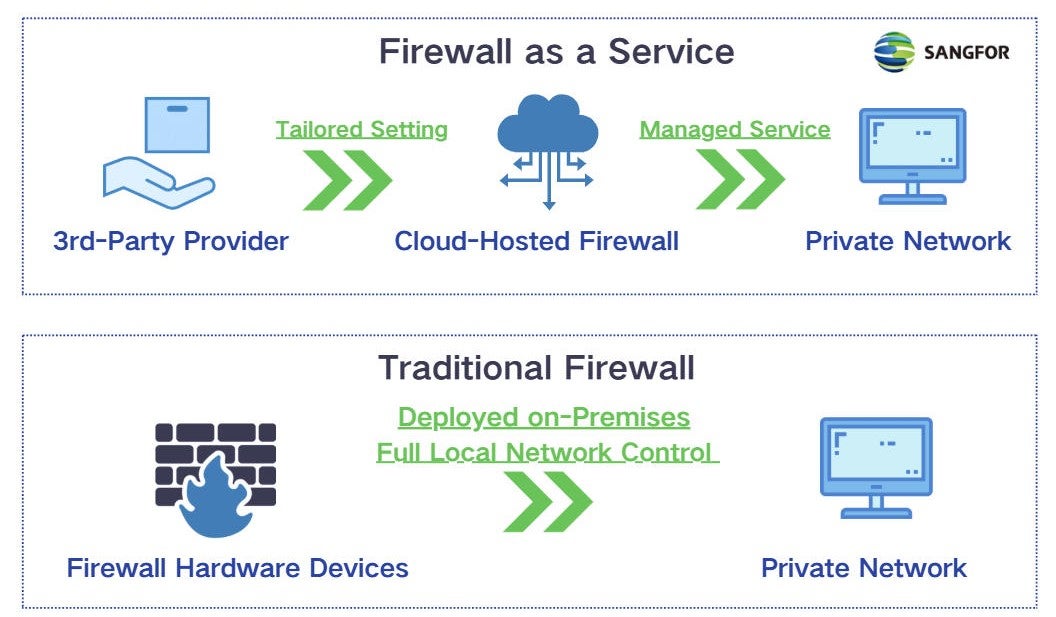As businesses adopt cloud-based infrastructures and remote work models, traditional hardware firewalls are often too rigid and costly to keep up with their evolving needs. Firewall as a Service (FWaaS) offers an efficient, scalable, and cost-effective alternative by moving firewall protections to the cloud. This service allows organizations to secure their networks without the complexity of managing physical devices, providing real-time threat detection, and offering flexible scalability as businesses grow.
In this guide, we'll explore the concept of FWaaS, how it works, and its benefits over traditional firewalls. We’ll also discuss why FWaaS is becoming the go-to solution for organizations looking to enhance their network security in today’s rapidly changing digital environment.

What is Firewall as a Service (FWaaS)?
Firewall as a Service (FWaaS) is a cloud-based cybersecurity solution that allows organizations to secure their network traffic through a cloud-hosted firewall. Unlike traditional firewalls that are deployed on-premises, FWaaS is fully managed by a third-party provider, which means businesses do not need to handle physical devices or software updates.
This service offers the same level of protection as traditional firewalls—by monitoring and filtering traffic—but it is hosted in the cloud, allowing organizations to manage their security remotely. With FWaaS, businesses can benefit from continuous security updates, scalability, and cost-efficiency.
The service provider takes care of firewall configuration, management, and monitoring, ensuring that the network remains secure and up-to-date. This makes it especially useful for businesses looking to embrace digital transformation without the headache of hardware management.

How Does FWaaS Work?
FWaaS operates using a cloud-based model. Here's how it works in a nutshell:
- Traffic Filtering: All incoming and outgoing traffic is routed through the cloud firewall. It scans the traffic for potential threats such as malware, data breaches, and other types of cyberattacks.
- Real-Time Protection: FWaaS constantly monitors traffic and provides real-time updates to prevent attacks. The service uses advanced threat intelligence to detect emerging threats and block them before they can cause damage.
- Scalability: One of the primary benefits of FWaaS is scalability. As your business grows, your security needs grow too. FWaaS allows businesses to scale their firewall protection easily, without the need to upgrade physical hardware.
- Remote Management: Since FWaaS is cloud-based, businesses can manage the firewall remotely, making it perfect for distributed teams and remote workforces. The provider also manages updates, patches, and routine maintenance.
- Cloud Integration: FWaaS seamlessly integrates with other cloud-based solutions and on-premise infrastructure. This integration ensures that businesses maintain a consistent level of security, regardless of where their infrastructure is hosted.
Advantages of FWaaS
- Cost Savings: Since FWaaS eliminates the need for on-site equipment and hardware maintenance, businesses save on capital expenditures and labor costs.
- Enhanced Security: FWaaS leverages advanced features such as intrusion detection, traffic filtering, and automatic threat intelligence updates to provide top-tier protection.
- Simplified Management: Firewall as a service allows businesses to reduce the complexity of managing security infrastructure. Service providers handle all updates, monitoring, and configuration.
- Scalability: Businesses can scale their firewall capabilities to match their growth, ensuring they remain secure as they expand without investing in additional hardware.
- Support for Hybrid and Multi-Cloud Environments: FWaaS is ideal for businesses operating in hybrid cloud or multi-cloud environments, providing centralized security regardless of where the infrastructure is hosted.
FWaaS vs NGFW (Next-Generation Firewalls)
Both FWaaS and Next-Generation Firewalls (NGFW) serve the same purpose: protecting network traffic from cyber threats. However, they differ significantly in how they operate:
- Deployment: NGFWs are on-premise devices installed within the organization's network, whereas FWaaS is cloud-based and managed remotely by a service provider.
- Flexibility: FWaaS offers greater flexibility, especially for businesses with a remote workforce or those that operate in the cloud. NGFWs, on the other hand, are better suited for traditional, on-premise environments.
- Scalability: FWaaS is more scalable because businesses can adjust their service without adding physical hardware. NGFWs may require additional devices or upgrades as the business grows.
- Management: FWaaS is managed entirely by the provider, while NGFWs typically require internal IT teams to handle configuration, monitoring, and updates.
In short, FWaaS is ideal for businesses seeking flexibility, scalability, and ease of management, while NGFW may still be the best choice for enterprises with complex, on-premise security requirements.
Primary Features of FWaaS
- Intrusion Prevention: Detects and blocks malicious activities before they can affect the network.
- Traffic Filtering: Inspects incoming and outgoing traffic for known threats, ensuring that only authorized data passes through.
- Real-Time Updates: FWaaS offers continuous updates, ensuring that businesses stay protected from the latest threats.
- Secure VPN: FWaaS includes VPN support to provide secure connections for remote workers, ensuring that data remains encrypted and protected.
- Advanced Threat Intelligence: Uses real-time threat intelligence feeds to detect and block zero-day attacks and other evolving threats.
Frequently Asked Questions
FWaaS is a cloud-based firewall solution that protects your network from cyber threats without the need for on-site hardware.
FWaaS filters network traffic in real-time through a cloud firewall, ensuring that malicious traffic is blocked before it reaches your network.
Firewall services protect your network by monitoring and controlling incoming and outgoing traffic to prevent unauthorized access and cyberattacks.
FWaaS is ideal for businesses with remote workforces and cloud environments, while NGFW is better suited for on-premise security in more traditional setups.
Conclusion
FWaaS offers businesses a modern, scalable, and cost-effective solution to network security. Whether you are a small business looking to protect sensitive data or a large enterprise in need of flexible security, FWaaS provides the tools you need to stay secure in an increasingly digital world.





